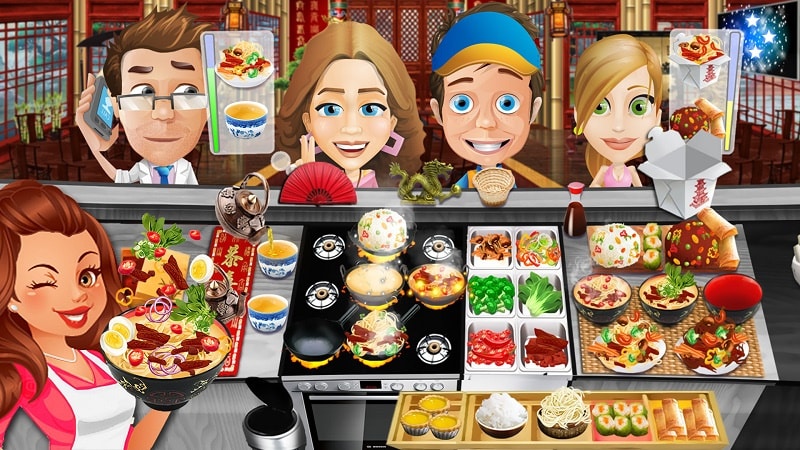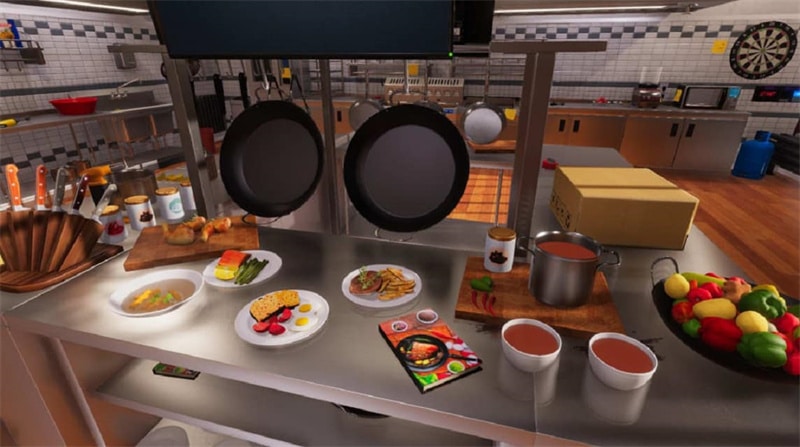
Cooking games have progressed from simple video games to sophisticated virtual reality experiences since their inception.
These games have intrigued players of every generation, providing a fun and interactive way to learn about the culinary world. Cooking games have transformed the gaming industry thanks to technological advancements, providing immersive and realistic cooking experiences which blur the lines between the virtual and real worlds.
In this guest post, we'll take a look back at the evolution of cooking games, from their humble origins to today's cutting-edge virtual reality experiences. We will look at how technological advancements have transformed cooking games into immersive enjoyable experiences that have captured the hearts of players all over the world.
The Early Days
Cooking games have their origins in simple online games that first appeared in the early days of the Internet. These games were simple and frequently browser-based, with simple graphics and limited gameplay choices. They usually entailed choosing ingredients, following recipe instructions, and making virtual meals.
Players could experiment with various ingredients, cook different meals, and even provide them to virtual customers at times. These early cooking games were simple in terms of gameplay and visuals, but they laid the groundwork for cooking games to become a popular genre in the gaming industry.
“Cooking Mama,” an array of games that appeared on the Nintendo DS in 2006, was an early pioneer in online cooking games. This game immersed players in an online kitchen where they were able to slice, dice, stir, and cook different ingredients to make virtual meals. It quickly became popular among players of every age, and its popularity established the way for other cooking games to enter the gaming scene.
Technological Advancements

The standard and complexity of cooking games improved as technology advanced. The advent of 3D graphics and realistic gameplay mechanics transformed the world of gaming, including the cooking game genre. Cooking games began to include enhanced graphics, lifelike animations, and realistic physics, allowing players to interact more immersively with virtual ingredients and kitchen tools.
Cooking games began to offer more advanced gameplay options and improved graphics with the introduction of gaming consoles such as the PlayStation, Xbox, and Nintendo Switch. Realistic cooking challenges and competitions were brought to players' screens in games like “Iron Chef America: Supreme Cuisine” and “Top Chef: The Game,” enabling them to experience the thrill of cooking in a virtual kitchen. These games displayed professional chefs, real-world recipes, and cooking techniques, giving players a virtual taste of the culinary world.
Furthermore, developments in mobile gaming have aided the evolution of cooking games. Cooking games became easier and more enjoyable to play on the go with the increasing popularity of smartphones and tablets. Mobile cooking games like “Cooking Fever” and “Food Truck Chef” grew in popularity among players who enjoyed cooking on their mobile devices, as they provided a variety of culinary challenges, virtual restaurants, and ingredients to experiment with.
The Next Frontier of Cooking Games
Virtual reality (VR) technology is one of the many significant developments in the field of gaming that has had an important effect on cooking games. Cooking games have embraced VR technology to offer players unmatched culinary adventures in online kitchens.
Virtual reality cooking games provide players with a truly immersive experience in which they can step through a virtual kitchen and interact in a highly realistic manner with virtual items and kitchen tools. Using motion controllers, players can chop, slice, stir, and cook, simulating the physical behaviours of cooking in a virtual environment. The virtual kitchen's visual and auditory feedback creates a sense of existence, making players feel as if they are actually cooking in the real kitchen.
“Job Simulator: The 2050 Archives,” which came out in 2016 for various VR platforms, was an early example of a virtual reality cooking game. Players enter a futuristic kitchen and complete various cooking tasks such as cutting vegetables, cooking eggs, and presenting food to virtual customers. The game makes use of virtual reality technology to offer an immensely interactive and immersive cooking experience, allowing players to experiment with various ingredients and cooking techniques in a virtual environment.
Virtual reality cooking games have evolved since then, providing more lifelike and elegant gameplay experiences. Cooking simulation games like “Cooking Simulator VR” and “ChefU” give players access to elaborate virtual kitchens, genuine physics-based interactions among ingredients and kitchen tools, and the capability to create complex recipes and dishes.
Some virtual reality cooking games include multiplayer features, allowing players to cook with friends or compete against one another in virtual culinary challenges.
The Impact of Virtual Reality on Cooking Games
Virtual reality has had an enormous effect on the cooking game genre, introducing new levels of involvement and interaction to players. VR technology's realistic and intuitive gameplay mechanics allow players to feel as if they are preparing foods in a real kitchen, with the capability to chop, slice, stir, and prepare using natural hand movements.
One of the most significant features of virtual reality cooking games is the sense of presence they provide. With plausible graphics, visuals, and sound effects that mimic the sights and sounds of a real kitchen, players can both see and hear and perceive the virtual kitchen as if it were real. This sense of presence increases player immersion and engagement, making the gaming experience pleasant and memorable.
Virtual reality cooking games also allow players to gain knowledge while honing their culinary abilities in a safe and controlled setting. Players can try out new ingredients, methods of cooking, and recipes without worrying about causing mistakes or wasting real ingredients. This allows players to boost their culinary confidence, learn new methods of cooking, and even inspire creativity in the kitchen.
Furthermore, virtual reality cooking games have promoted a sense of belonging and social interaction among participants. Multiplayer options in virtual reality cooking games enable players to cook together, work together on recipes, and exchange culinary experiences with one another or even players from all over the world. This social aspect of virtual reality cooking games allows players to connect, form friendships, and share their experiences food the love of cooking.
The Future of Cooking Games

As technology advances, the next generation of cooking games will undoubtedly be more thrilling and immersive. Virtual reality technology is constantly evolving, with advances in graphics, hardware, and gameplay mechanics resulting in even more realistic and dynamic cooking experiences.
We are also anticipating more integration of other emerging technologies in cooking games, such as augmented reality (AR) and artificial intelligence (AI). AR technology may enable players to superimpose virtual ingredients and cooking instructions in real-world kitchen environments, resulting in an effortless combination of virtual and real-world elements. AI could improve gameplay by recommending recipes, cooking techniques, and ingredient substitutions based on player preferences and dietary restrictions.
Additionally, with a growing emphasis on sustainability and nutritious food, we may see more cooking games that include eco-friendly cooking customs, farm-to-table concepts, and plant-based cooking options. This could not only provide players with a fun gaming experience but also raise awareness about important social and environmental issues concerning food and cooking.
Conclusion
Cooking games have progressed from simple online games to sophisticated virtual reality experiences, and they continue to evolve as technology advances. The gaming industry has been transformed by virtual reality, which provides players with immersive and realistic cooking experiences that blur the lines between the virtual and real worlds. Interactivity and the sense of being present.










